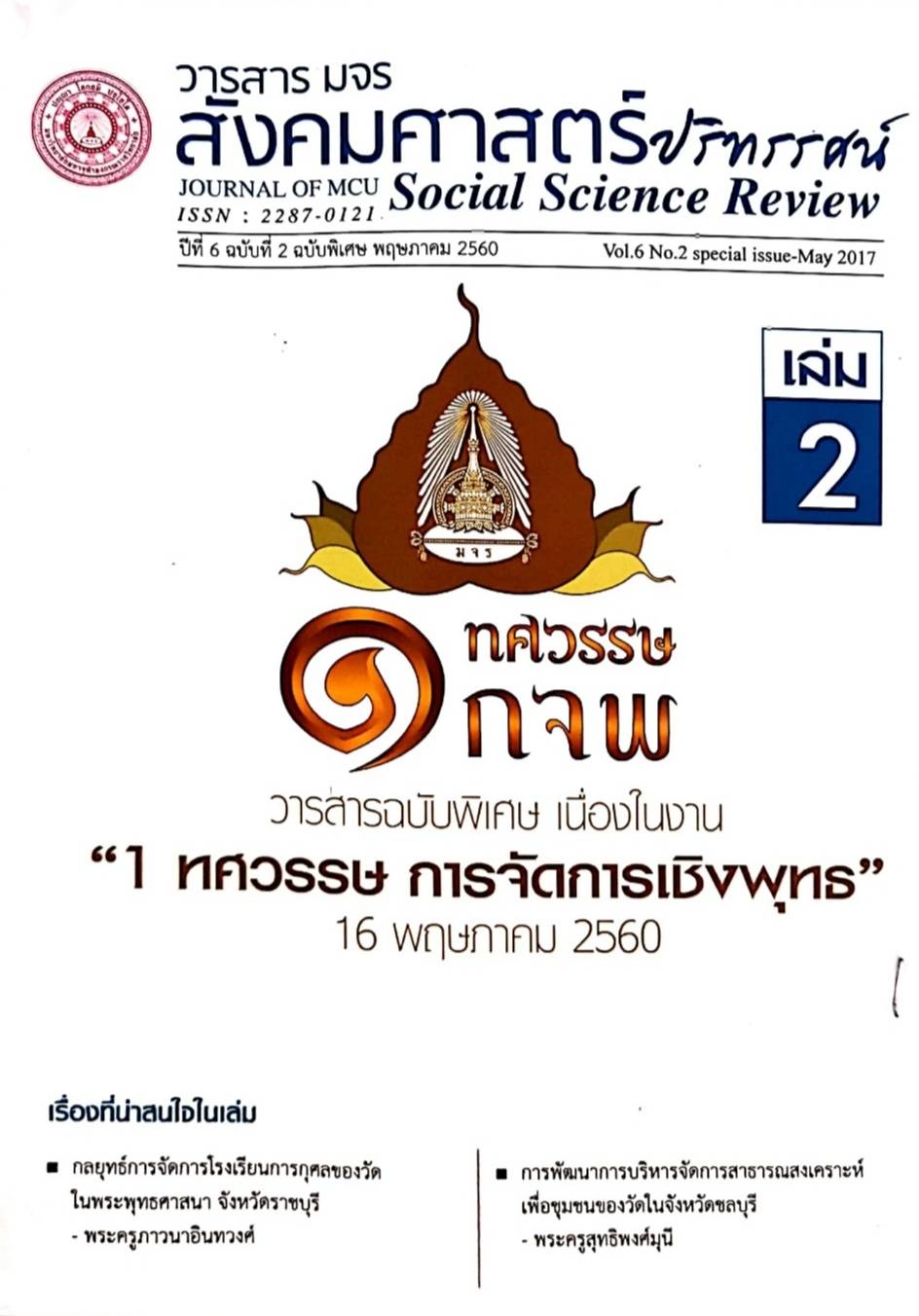การพัฒนารูปแบบการฝึกอาชีพตามแนววิถีพุทธของทหารกองประจาการ ค่ายสุรนารี จังหวัดนครราชสีมา
คำสำคัญ:
วิถีพุทธ, การพัฒนารูปแบบการฝึกอาชีพบทคัดย่อ
บทความวิจัยนี้ มีความมุ่งหมาย 3 ประการ 1) เพื่อศึกษาประวัติความเป็นมาของการฝึกอาชีพตามแนววิถีพุทธของทหารกองประจาการค่ายสุรนารีจังหวัดนครราชสีมา 2) เพื่อศึกษาสภาพปัจจุบันและปัญหาของการฝึกอาชีพตามแนววิถีพุทธ 3) เพื่อศึกษาการพัฒนารูปแบบการฝึกอาชีพตามแนววิถีพุทธของทหารกองประจาการ ค่ายสุรนารี จังหวัดนครราชสีมา โดยมีระเบียบวิธีการวิจัยคือ ระเบียบวิธีวิจัยเชิงคุณภาพ ผลการวิจัย พบว่า การฝึกอาชีพตามแนววิถีพุทธของทหารกองประจาการค่ายสรุนารี เป็นรูปแบบหนึ่งของการฝึกอาชีพของทหารกองประจำการในอดีตและสภาพปัจจุบันการฝึกอาชีพของทหารกองประจำการมีความสัมพันธ์กับอาชีพเดิมของทหาร ได้แก่รูปแบบการฝึก อาชีพช่างเดินสายไฟฟ้าเบื้องต้น ช่างทาเหล็กดัด ช่างไม้ ขับรถยนต์ ทำปุ๋ยหมัก และทำปุ๋ยน้าหมักชีวภาพ แต่ประสบปัญหาเรื่องงบประมาณน้อย สภาพอาคารและอุปกรณ์ไม่ค่อยพร้อม ครูมีประสบการณ์น้อย ทหารกองประจำการมีประสบการน้อย ระยะเวลาน้อย หลักสูตรไม่สมบูรณ์ ซึ่งจากสภาพปัจจัยปัญหาดังกล่าว ได้การพัฒนารูปแบบการฝึกอาชีพตามแนววิถีพุทธ 5 ด้านได้แก่ ความซื่อสัตย์ ความขยันอดทน การประหยัดอดออมการตรงต่อเวลา และการมีระเบียบวินัย
เอกสารอ้างอิง
กรมการพัฒนาชุมชนกระทรวงมหาดไทย. รายงานคุณภาพชีวิตของคนไทยจากข้อมูลความจาเป็นพื้นฐาน
(จปฐ.) ปี 2549. กรุงเทพฯ : บีทีเอส เพรส จากัด, 2549.
กรมยุทธการทหารบก. กาหนดหลักเกณฑ์การดาเนินการและการให้การสนับสนุนการฝึกอบรมวิชาชีพ
ของหน่วยในกองทัพบก กรุงเทพฯ : สานักพิมพ์ หจก.อรุณการพิมพ์, 2535.
พระธรรมปิฎก (ป.อ. ปยุตฺโต) พระพุทธศาสนาพัฒนาคนและสังคม. กรุงเทพฯ: โรงพิมพ์กรมการศาสนา,
2542
พระราชบัญญัติรับราชการทหาร, กรุงเทพ ฯ : โรงพิมพ์องค์การสงเคราะห์ทหารผ่านศึก, 2497.
พระสุบิน ปณีโต. สร้างผู้ประกอบการเพื่อสังคมใช้ “วัด-พระ”เชื่อมใจชุมชน สร้างกาไรให้ “ค น แ ต ก -
สัง ค ม แ ต ก ”http://thaipublica.orglica.org/2 0 1 2 / 0 3 / phra-subin-socialentrepreneur>
13 มกราคม 2556.
พัชรินทร์ ปิยวณิชพงษ์. ศึกษาปัจจัยที่มีอิทธิพลต่อความต้องการเลือกประกอบอาชีพส่วนตัว ข อ ง นิสิต
จุฬาลงกรณ์วิทยาลัย, กรุงเทพฯ : 2535.
ไพศาล มุ่งวัฒนา. การศึกษาไทยในยุคโลกาภิวัตน์. กรุงเทพฯ : สานักพิมพ์ไว้ลาย, 2549.
มหาจุฬาลงกรณราชวิทยาลัย. พระไตรปิฎกภาษาไทย ฉบับมหาจุฬาลงกรณราชวิทยาลัย.
กรุงเทพมหานคร : โรงพิมพ์มหาจุฬาลงกรณราชวิทยาลัย, 2539.
Avolio, B. J. 1999. Full Leadership Development. California: SAGE Publication.
Ali Nasermoaddeli, Michikazu Sekine, Shimako Hamanishi andSadanobu Kagamimori.
2003a.
Associations between sense ofcoherence and psychological work characteristics with
changesin quality of life in Japanese Civil Servants: a 1-year follow-upstudy.
Industrial Health, 41: 236-241.
Ali Nasermoaddeli, Michikazu Sekine, Shimako Hamanishi andSadanobu Kagamimori.
2003b. Associations of sense ofcoherence with sickness absence and reported
symptoms ofillness in Japanese
Civil Servants. Journal of OccupationalHealth, 45:231-233.
ดาวน์โหลด
เผยแพร่แล้ว
รูปแบบการอ้างอิง
ฉบับ
ประเภทบทความ
สัญญาอนุญาต
ลิขสิทธิ์ (c) 2020 วารสาร มจร สังคมศาสตร์ปริทรรศน์

อนุญาตภายใต้เงื่อนไข Creative Commons Attribution-NonCommercial-NoDerivatives 4.0 International License.
เพื่อให้เป็นไปตามกฎหมายลิขสิทธิ์ ผู้นิพนธ์ทุกท่านต้องลงลายมือชื่อในแบบฟอร์มใบมอบลิขสิทธิ์บทความให้แก่วารสารฯ พร้อมกับบทความต้นฉบับที่ได้แก้ไขครั้งสุดท้าย นอกจากนี้ ผู้นิพนธ์ทุกท่านต้องยืนยันว่าบทความต้นฉบับที่ส่งมาตีพิมพ์นั้น ได้ส่งมาตีพิมพ์เฉพาะในวารสาร มจร สังคมศาสตร์ปริทรรศน์ เพียงแห่งเดียวเท่านั้น หากมีการใช้ภาพหรือตารางหรือเนื้อหาอื่นๆ ของผู้นิพนธ์อื่นที่ปรากฏในสิ่งตีพิมพ์อื่นมาแล้ว ผู้นิพนธ์ต้องขออนุญาตเจ้าของลิขสิทธิ์ก่อน พร้อมทั้งแสดงหนังสือที่ได้รับการยินยอมต่อบรรณาธิการ ก่อนที่บทความจะได้รับการตีพิมพ์ หากไม่เป็นไปตามข้อกำหนดเบื้องต้น ทางวารสารจะถอดบทความของท่านออกโดยไม่มีข้อยกเว้นใดๆ ทั้งสิ้น





